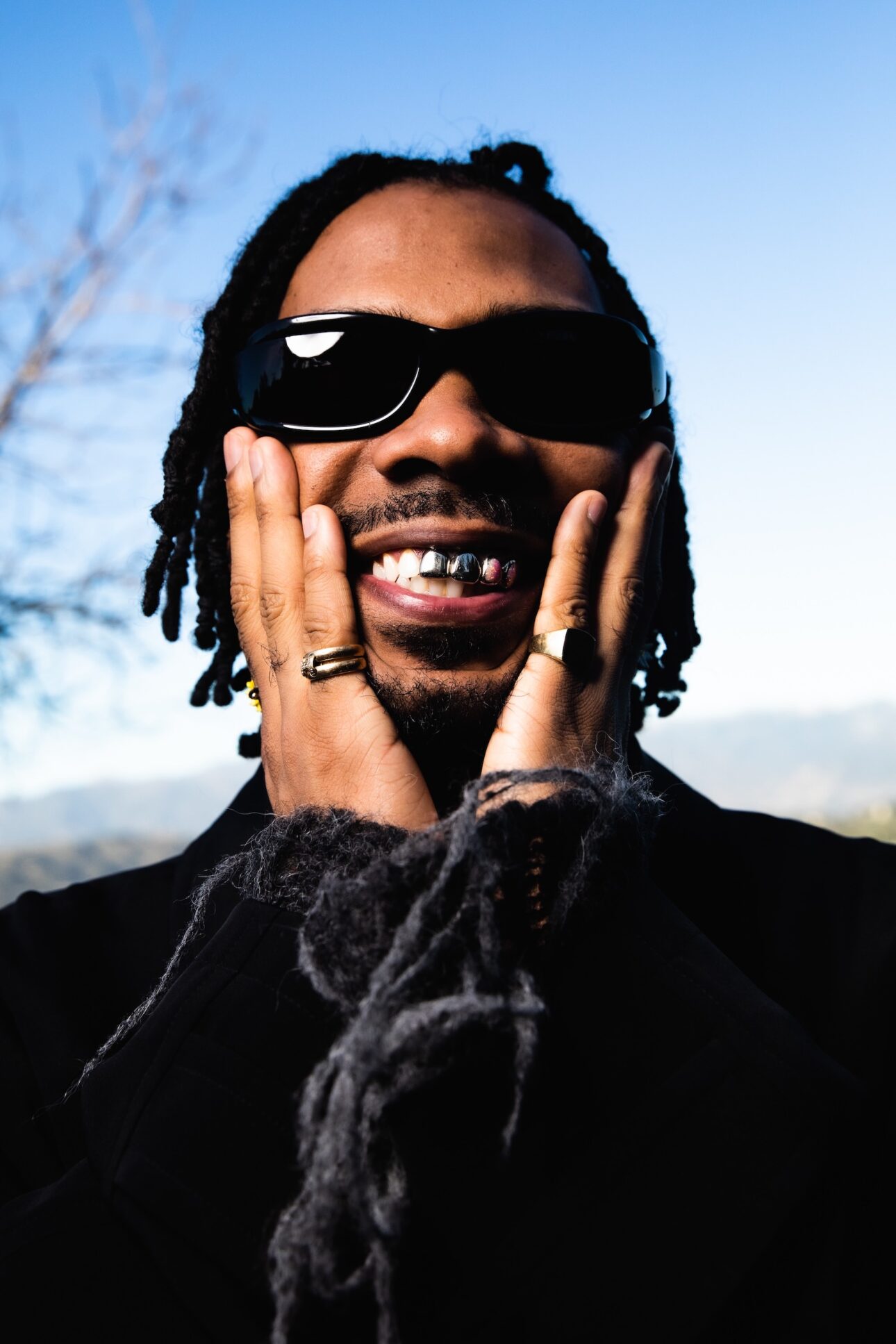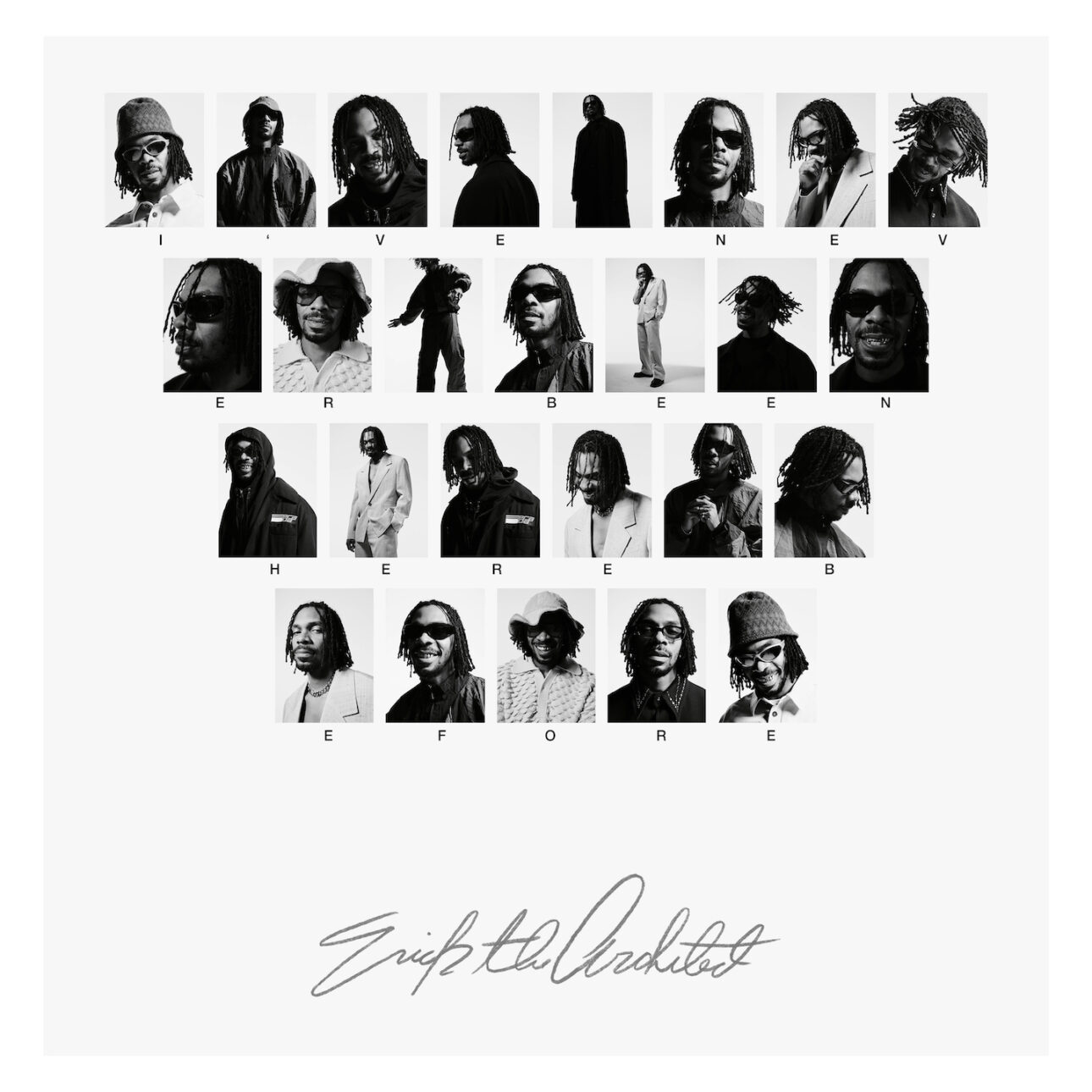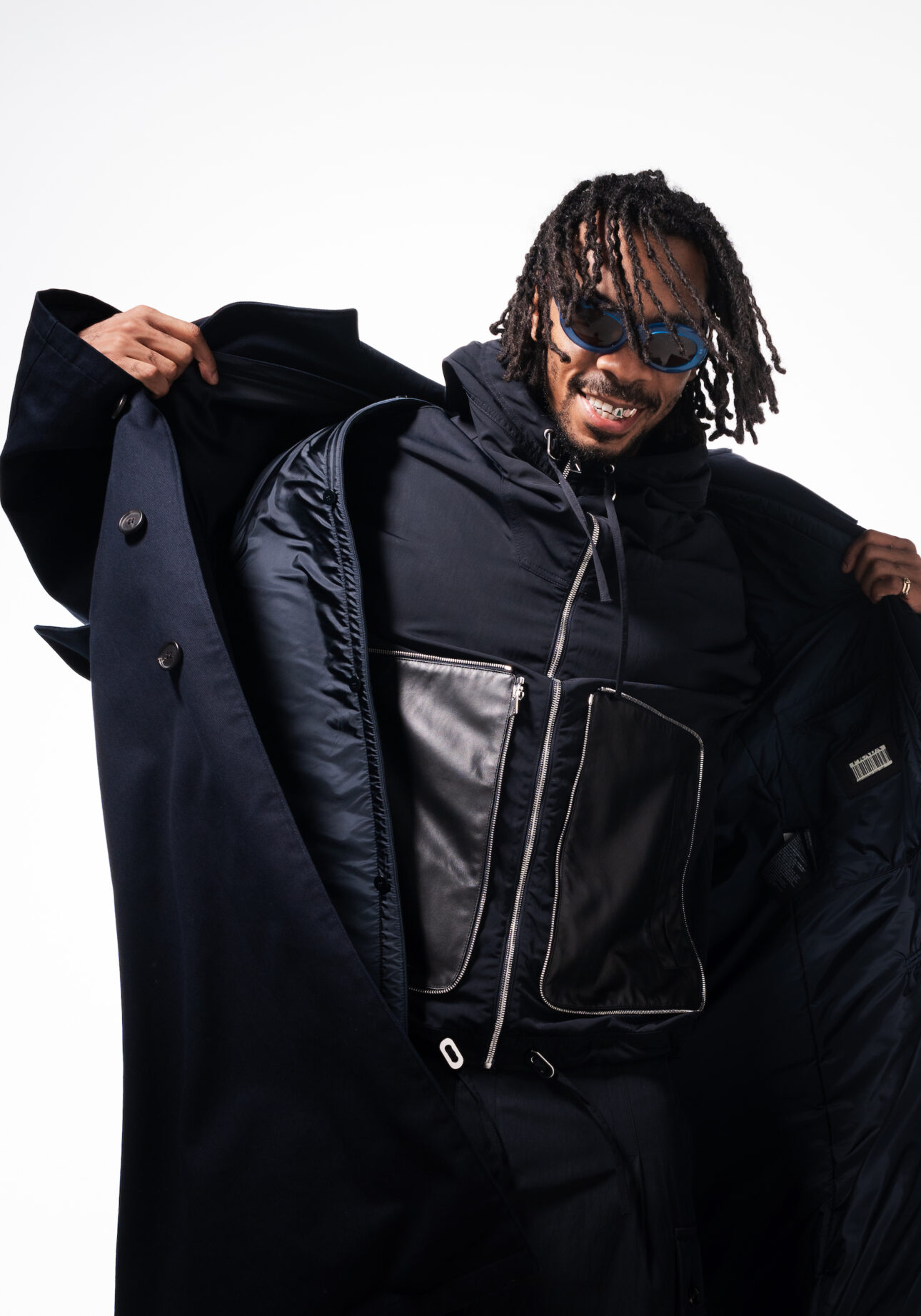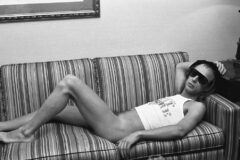Rapper-producer Erick the Architect thinks a lot about New York City. Born Erick Arc Elliott, he grew up there and learned to love music and how to create it, first as part of the acclaimed hip-hop trio Flatbush Zombies. The city remains a central subject for him, even after relocating to Los Angeles to continue his solo career, as he reflects deeply on his hometown on the new single, “CA$HMERE TEAR$.”
The song is one of several new tracks on the new deluxe edition of his debut solo album, I’ve Never Been Here Before, originally released in February. That double album already featured appearances by George Clinton (“Ezekiel’s Wheel”), James Blake (“Parkour”), and others among its 16 tracks. “CA$HMERE TEAR$” is an autobiographical echo from his New York adolescence.
The song is a followup to the dreamy, nostalgic single “Beverly Drive,” an ode to the Flatbush street that raised him. The new track represents his time in the city and “the part of me that was inspired every day, just being from Flatbush,” he says. “‘Beverly Drive’ is almost like New York in the morning, and ‘CA$HMERE TEAR$’ is like New York at night.”


The track opens with a brassy blast of horns, at once modern and connected to the woozy bop past, easing into a soulful bass groove and Erick’s statement on the New York he knew as locals cheered him on for his music and accolades: “You know I hold it down, but I think, I’m like, ‘Who’s backin’ me?’/ Oldheads told me, ‘Go ‘head, go get that plaque for me.’”
Aside from the new album, Erick created the original score for last year’s The Choice Is Yours, a documentary about Black Sheep’s Andres “Dres” Vargas-Titus working to finish tracks begun by the legendary J.Dilla. And he’s back on tour for several West Coast dates this January and February, joining the French pop group L’impératrice. (Erick appeared on L’impératrice’s Pulsar.) And he’s already planning another unnamed project for next year.
As we spoke last week from his LA home, “CA$HMERE TEAR$” had just been released, and was excited for the new track to hit the streets. “It’s like the first day of school,” Erick says with a smile during an online video call. “I reach out to the people I make the music with and just tell them I appreciate them, because it’s a win. Sometimes we forget to be grateful for the fact that you can even do it.”
On social media, you called “CA$HMERE TEAR$” “one of the best songs I’ve ever made.” Why do you feel that way?
Erick the Architect: It’s one of my best because the narrative is so true. It’s about New York before it was gentrified. When I say, “I hold it down, but I’m thinking like, who’s backing me?” — if somebody’s holding me down physically, I can’t move. But if somebody’s holding you down emotionally, you can move as much as you can. But who’s backing me? My forefathers and my uncles, my OGs, my pops: “I want you to do as big as you possibly can in your life. I want you to bring home the gold,” and that could be figurative. The gold that I saw as a kid, it wasn’t accomplishments and trophies, it was jewelry. It was things that aesthetically were beautiful. And I’m like, “Well, I got a gold record now.” We all like shiny things. But this was a different level of pride.
It has a very definite vibe with those horns at the beginning.
It feels live, right? It feels like this is a fanfare, really big stadium stuff. The first couple of seconds of a song probably get people to pull in. I really wanted it to be something that captivated you before I even said anything. I thought it having live horns in those first seconds was like, “What is about to happen?” It sounds like a curtain is about to come down. I was going for cinema, for something that felt like it was supposed to be on a big screen.
You recorded in LA. Is it easier to write about a different time in New York when you’re not in New York?
The lyrics were written over two years ago. The lyrics were always very strong, reminiscing on the way things used to be. Being that far away from New York, it makes it easier for you to dream and think about what things used to be like. This is maybe my way of showing people that even though I live on the West Coast, I’m still very much a New Yorker.


In the song, you talk about changes in New York including gentrification. Are you sad about those changes?
After COVID, in New York, the pulse is different. I feel like whatever the BPM or pulse was prior, it definitely slowed down a little bit. Maybe something sped up. To watch some of the independent businesses and stores go away for Starbucks and Targets, it does make me sad. Some of the stuff that was prevalent when I was there as a kid is just gone. Some of it wasn’t legal or good, but what is? Bootleg CDs and DVDs and all that shit was very illegal, but these companies have so much money and this dude selling on the street has nothing.
CDs are how I fell in love with music. And New York was pivotal for DVDs and CDs. You could go to Church Avenue, you could go to Flatbush Avenue, and pick up anything … a guy with a blanket with all the CDs laid down and you picking something out by the cover and flipping it to the back, and this shit has like 40 songs on it. That was how I learned how to make music, really. I could spend $20 and get four CDs. Now I spend $20 listening to everything on the Internet.
Did you find that kind of energy moving to LA, or did you find a different energy?
I found a different energy. I found an energy that challenged my creativity. It challenged how much I really wanted to do this, to be independent and to resist the things that may happen to you when you move to a new place. It’s like going to a new school. You have to make new friends. You don’t know where to go to eat. But I thrive in situations like that because it forces me to look at my reflection. I thought that if I came here, I would be thrown into the fire to figure out what I was gonna do.
I’ve Never Been Here Before was already a double album. Why expand it with so many new tracks for the deluxe edition?
People are scared to make long projects now. They’re like, “Oh, if the song is over three minutes, it doesn’t get playlisted,” or whatever the hell the rules supposedly are. I was like, well, I’ll chop a couple [of songs] off and give people a second helping [later]. A lot of people when they do a deluxe, it’s just a bunch of leftover trash. Whether the artist thinks that or not, how it’s delivered is sometimes very underwhelming. Nah, bro, this is “CA$HMERE TEAR$.” I’m giving you one of the best records now. Why didn’t you put that on the original? I’m like, this was always the plan.


Has being a producer has helped you have that broader perspective?
Absolutely. No disrespect to people who just rap or just sing, but … I want to get my hands on the actual arrangement and play an instrument or tap someone on the shoulder that plays bass better than me so I can get it to sound a certain way. All my friends are pretty dope musicians and always willing to add an idea. We can always get to something where we are all contributing our best asset to make a song, you know?
What’s it like working with George Clinton?
Oh, man. This guy is so important to music, so important to history, to funk music, to black culture. Him and James Brown were probably the two people that reminded me of my mom because she called that “real music.” He’s a remarkable musician and he’s a remarkable person. He sent me way more than what I asked for, and I had to pick the parts that spoke to the record the most. But that was so easy.
You like to work with very different kinds of people.
I guess I don’t realize how weird I am. Even as a young kid growing up in the hood, listening to rock music, people used to say, “Why you listening to white people music?” And I was like, “Rock was not invented by white people.” And I’m a kid with these thoughts. I’ve always thought we should learn from each other, and music became the catalyst for how I communicated with people. As a kid, Z100 was one of the biggest radio stations and you’d hear Madonna and Edward McCain and Aerosmith, and I associated pop music with just pop music. I didn’t think it was white or black.
You created an 8-bit-style video game to go with this album. What inspired that?
When I was a kid, my brother had a Commodore Vic 20. We had a Nintendo and ColecoVision. And the 8-bit look and the sounds are so nostalgic to me. I’m a gamer. Most of the effort that I put into it was selfish. It was for me. And then I was like, cool, let’s put it on the Internet for people to actually play. I would’ve made it just for me to play with my friends.

